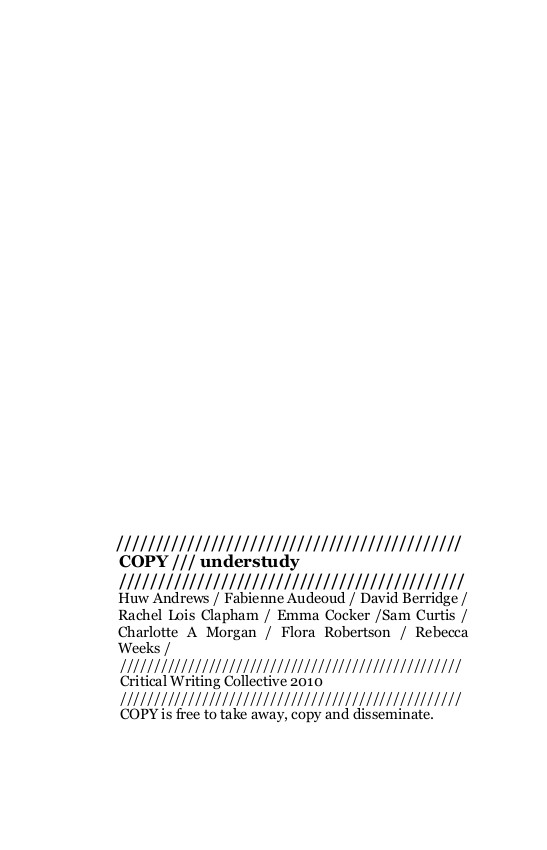V2_: The Era of Objects (2011)
Filed under book | Tags: · art, design, internet of things, object, technology

This e-Book, the third in the series of Blowup Readers released by V2_, explores the future of objects, beyond the clichéd fantasy of the flying car.
Blowup is a series of events and exhibitions that explore contemporary questions from multiple viewpoints. Blowup zooms in on ideas, bringing into focus clear pictures of how art, design, philosophy, and technology are transforming our lives — or reinforcing the status quo.
Contributions by Anab Jain, Jon Ardern, and Justin Pickard; Alexandra Deschamps-Sonsino; Rob van Kranenburg; Julian Bleecker; Ilona Gaynor; Ana Serrano and Tim Warner; Bruce Sterling
Introduction by Michelle Kasprzak
Publisher: V2_, Rotterdam, September 2011
Blowup Reader #3
53 pages
Levi R. Bryant: The Democracy of Objects (2011)
Filed under book | Tags: · object, object-oriented ontology, onticology, ontology, philosophy, speculative realism, systems theory

Since Kant, philosophy has been obsessed with epistemological questions pertaining to the relationship between mind and world and human access to objects. In The Democracy of Objects, Bryant proposes that we break with this tradition and once again initiate the project of ontology as first philosophy. Drawing on the object-oriented ontology of Graham Harman, as well as the thought Roy Bhaskar, Gilles Deleuze, Niklas Luhman, Aristotle, Jacques Lacan, Bruno Latour and the developmental systems theorists, Bryant develops a realist ontology that he calls “onticology”. This ontology argues that being is composed entirely of objects, properties, and relations such that subjects themselves are a variant of objects. Drawing on the work of the systems theorists and cyberneticians, Bryant argues that objects are dynamic systems that relate to the world under conditions of operational closure. In this way, he is able to integrate the most vital discoveries of the anti-realists within a realist ontology that does justice to both the material and cultural. Onticology proposes a flat ontology where objects of all sorts and at different scales equally exist without being reducible to other objects and where there are no transcendent entities such as eternal essences outside of dynamic interactions among objects.
Print and downloadable e-book versions will be available soon from the publisher.
Publisher: Open Humanities Press, September 2011
New Metaphysics series
ISBN 978-1-60785-204-9
Licensed under a Creative Commons Attribution-ShareAlike 3.0 Unported License.
PDF (updated on 2012-7-17)
View online (HTML; requires a free account)
COPY, 1: Understudy (2010)
Filed under magazine | Tags: · art, art criticism, contemporary art, performance, united kingdom

“COPY is a publication of critical/experimental writing as or in the field of visual art and performance.
This issue of COPY is launched as part of The Plaza Principle, curated by Derek Horton and Chris Bloor in the partially vacant 1980s Leeds Shopping Plaza; an exhibition that aims to acknowledge the economic context in which artists are invited to occupy vacant shop units to disguise or compensate for economic decline in the nations town, city and district centres, supplementing commercial inactivity with cultural activity.
COPY proposes understudy as a point from which to consider, reflects and interrupt this context through a collection of art writing around the stand in – the temporary, illusory, consumed or performed; smoke and mirrors; the assessed, inquired or theorized. The works in this issue address, allude to or form tangents from these ideas and present a range of approaches to the use of the page, print and the form and nature of writing as or within practice.”
Contributors include Huw Andrews, Fabienne Audeoud, David Berridge, Rachel Lois Clapham, Emma Cocker, Sam Curtis, Charlotte A Morgan, Flora Robertson and Rebecca Weeks.
Developed by Critical Writing Collective, a network and platform for art writing and critical dialogue based in the Yorkshire region, UK.
Free to take away, copy and disseminate
26 pages
PDF (added on 2017-12-2)
Scribd

